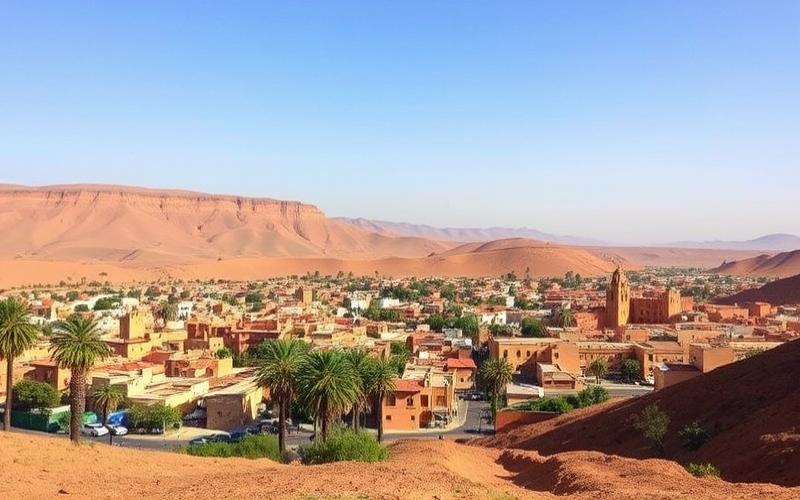
 Published on and written by Cyril Jarnias
Published on and written by Cyril Jarnias
Morocco, a country undergoing significant economic and social transformation, has seen substantial evolution in its labor law in recent years. Between the drive for modernization and the need to protect workers, the Cherifian Kingdom is attempting to strike a delicate balance. Let’s delve into the intricacies of Moroccan labor law, its advancements, and its challenges.
The Employment Contract: Cornerstone of the Employer-Employee Relationship
In Morocco, the employment contract is the cornerstone of the relationship between employer and employee. It defines the rights and obligations of each party while providing a protective legal framework for both sides.
The Permanent Contract, the Theoretical Standard
Theoretically, the Permanent Contract is the standard in Morocco. It provides job stability and security for employees. However, in practice, many companies resort to other forms of contracts, particularly Fixed-Term Contracts, for greater flexibility.
The Fixed-Term Contract, an Economic Reality
Fixed-Term Contracts are widely used in Morocco, particularly in seasonal sectors like tourism or agriculture. Moroccan law strictly regulates their use, limiting their duration to one year, renewable once. Beyond that, the contract is automatically converted to a Permanent Contract.
The Probation Period, an Adaptation Time
The probation period is a common practice in Morocco. It allows both employer and employee to ensure their compatibility. Its duration varies by employee status: 15 days for workers, 1.5 months for employees, and 3 months for managers, renewable once.
Good to Know:
Employment contracts in Morocco must be written in Arabic, with a French translation if necessary. They must include essential elements of the employment relationship, particularly salary, position held, and contract duration.
Social Obligations: A System Seeking Efficiency
Morocco’s social protection system has seen significant advancements in recent years, but challenges remain in ensuring comprehensive coverage for all workers.
The CNSS, Pillar of Social Protection
The National Social Security Fund (CNSS) is the agency responsible for managing the social security system for private sector employees in Morocco. It covers risks related to illness, maternity, disability, old age, and death. Contributions are shared between employer and employee.
AMO, Toward Universal Health Coverage
Compulsory Health Insurance (AMO) was introduced in 2005 to improve access to healthcare. It covers medical, surgical, and pharmaceutical expenses. However, extending it to the entire population remains a major challenge for Moroccan authorities.
Annual Leave, a Fundamental Right
Every employee in Morocco is entitled to paid annual leave. The minimum duration is 1.5 working days per month of actual work, or 18 working days per year. This duration increases with the employee’s seniority in the company.
Good to Know:
Morocco recently introduced 3-day paternity leave, a significant advancement for gender equality in the workplace.
SMIG: An Evolving Minimum Wage
The Guaranteed Interprofessional Minimum Wage (SMIG) in Morocco is a constant subject of debate among social partners. It represents the legal minimum that an employer must pay their employee.
A Gradually Increasing SMIG
The SMIG in Morocco has seen several increases in recent years. In 2023, it stands at 2,970 dirhams per month in the private sector, approximately 275 euros. In the agricultural sector, the Guaranteed Agricultural Minimum Wage (SMAG) is set at 2,141 dirhams per month.
Sectoral Disparities
Despite the existence of SMIG, significant wage disparities persist between different sectors in Morocco. Finance, information technology, and telecommunications sectors generally offer salaries well above the legal minimum.
The Enforcement Challenge
One of the main challenges remains the effective enforcement of SMIG, particularly in the informal sector which represents a significant portion of the Moroccan economy. Authorities are increasing inspections to ensure compliance with this legal obligation.
Good to Know:
Non-compliance with SMIG is punishable by a fine ranging from 300 to 500 dirhams per employee, up to a maximum of 20,000 dirhams.
Compensation in Morocco: A Contrasted Landscape
The Moroccan labor market shows great diversity in terms of compensation, reflecting the country’s economic and social disparities.
A Rising Average Salary
According to the latest available data, the average salary in Morocco is approximately 4,000 dirhams per month (about 370 euros). However, this figure masks significant disparities between sectors and regions.
The Highest-Paying Sectors
- Finance and insurance
- Information technology
- Pharmaceutical industry
- Aeronautics
- Automotive
Geographical Disparities
Major cities like Casablanca, Rabat, or Tangier generally offer higher salaries than rural areas or small towns. This disparity is explained by the concentration of high-value-added economic activities in these metropolitan areas.
Good to Know:
Despite an overall increase in salaries in recent years, Moroccans’ purchasing power remains a concern, particularly due to inflation.
In-Demand Skills: An Evolving Labor Market
The Moroccan labor market is evolving rapidly, in line with the country’s economic transformations. Certain skills are particularly sought after and offer better salary prospects.
Digital, a Leading Sector
Digital professions are particularly in demand in Morocco. Developers, data scientists, cybersecurity experts, or artificial intelligence specialists benefit from attractive salaries and numerous career opportunities.
Engineering, Still in Demand
Engineers, particularly in automotive, aeronautics, or renewable energy sectors, remain highly sought after in the Moroccan labor market. Their technical skills are valued and well-compensated.
Soft Skills, a Major Asset
Beyond technical skills, Moroccan employers increasingly value soft skills. Proficiency in languages (Arabic, French, English), communication abilities, and adaptability are major assets for professional advancement.
Good to Know:
Morocco is heavily investing in vocational training to meet labor market needs. Continuing education programs are also being implemented to enable employees to update their skills.
Unions and Workers’ Rights: Building Social Dialogue
The Moroccan union landscape is evolving rapidly, with growing awareness of the importance of social dialogue for the country’s economic and social development.
Union Pluralism
Morocco has several representative union federations, including the Moroccan Labor Union (UMT), the Democratic Confederation of Labor (CDT), and the General Union of Moroccan Workers (UGTM). This diversity reflects the plurality of opinions and demands among Moroccan workers.
The Right to Strike, a Regulated Achievement
The right to strike is recognized by the Moroccan Constitution. However, its exercise is regulated by Law 97.15, adopted in 2023 after lengthy negotiations. This law aims to organize the exercise of the right to strike while preserving the continuity of essential services.
Toward Strengthened Social Dialogue
Moroccan authorities have established social dialogue mechanisms, particularly through regular tripartite meetings between the government, unions, and employers. These negotiations have led to several important agreements in recent years, particularly regarding SMIG increases or improvements in social protection.
Good to Know:
The new strike law provides for sanctions against employers who obstruct the exercise of this right, with fines of up to 200,000 dirhams.
Moroccan labor law is constantly evolving, reflecting the country’s economic and social transformations. While significant progress has been made in recent years, particularly in social protection and social dialogue, challenges persist. Effective enforcement of laws, reducing wage inequalities, and extending social protection to all workers remain major challenges for the years ahead.
Disclaimer: The information provided on this website is for informational purposes only and does not constitute financial, legal, or professional advice. We encourage you to consult qualified experts before making any investment, real estate, or expatriation decisions. Although we strive to maintain up-to-date and accurate information, we do not guarantee the completeness, accuracy, or timeliness of the proposed content. As investment and expatriation involve risks, we disclaim any liability for potential losses or damages arising from the use of this site. Your use of this site confirms your acceptance of these terms and your understanding of the associated risks.

















